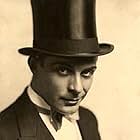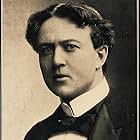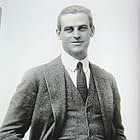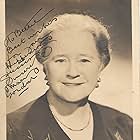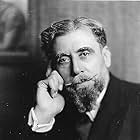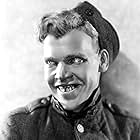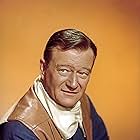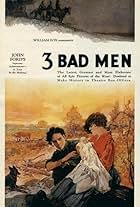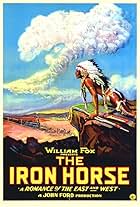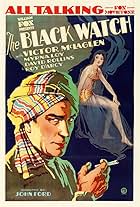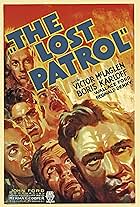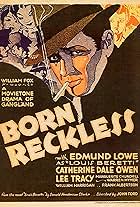"Citizen" Hogan, an exile Irish patriot, risks his life by returning to Ireland and helping a young couple."Citizen" Hogan, an exile Irish patriot, risks his life by returning to Ireland and helping a young couple."Citizen" Hogan, an exile Irish patriot, risks his life by returning to Ireland and helping a young couple.
Joseph Burke
- Neddy Joe - Dermot's Servant
- (uncredited)
Mike Donlin
- Racetrack Informant
- (uncredited)
Mary Gordon
- The Woman at Hogan's Hideout
- (uncredited)
Brian Desmond Hurst
- Horse Race Spectator
- (uncredited)
Eric Mayne
- Colonel of Legionnaires
- (uncredited)
Jack Pennick
- Man Bringing Dermot to Hogan
- (uncredited)
Belle Stoddard
- Anne McDermott
- (uncredited)
John Wayne
- Horse Race Spectator
- (uncredited)
- …
Storyline
Did you know
- TriviaProduction began in January 1928 and took seven weeks.
- GoofsWhen the horses jump over some of the apparently dry stone walls, their feet knock into some of them. The impact causes the obviously inauthentic walls to move forward and fall back again.
- Quotes
Citizen Hogan: Aren't you the D'Arcy who just left Paris?
John D'Arcy: [shakes his head] I've never been to Paris in my life.
Citizen Hogan: [nods] You haven't been to Hell yet, either... have you?
- Alternate versionsThe version shown on the American Movie Classics channel was a Museum of Modern Art preservation print. It had an uncredited piano score and ran 71 minutes.
- ConnectionsReferenced in Ethel & Ernest (2016)
Featured review
Citizen Hogan ( Victor McLaglen) is an Irish expatriate, wanted by the British, hiding out in the French Foreign Legion. He gets a message and says he must return to Ireland to kill somebody.
From the title and what goes on during the first part of the film, I was thinking that he came back to kill Lord Justice O'Brien (Hobart Bosworth), the titular hangman but actually a judge. Maybe the judge sentenced a friend or relative to hang? And although Ford builds this judge up as a very bad guy, haunted by the people he sentenced to death, I can never see what exactly he did that was wrong in the line of duty considering capital punishment was routine at the time. He wasn't said to take bribes. He wasn't convicting anybody, just sentencing them. Would the townspeople like him to just let murderers go? Would they prefer they be paroled in their house, in the bedroom next to their teen daughter's room? Since the townspeople hate him so, the only thing I can figure is that because he is an Irishman cooperating with the British system of justice, they just consider everybody executed by said British as a martyr and thus the judge as a traitor, even if the people he hanged would wreak chaos on normal people if freed. But I digress.
But the judge dies pretty quickly into the film, and yet Hogan hangs around, risking capture. So it turns out the judge was never his actual target, but the actual target is associated with the "Hangman's House".
This seems like a warm up for The Quiet Man in several ways. The tormented lovers kept apart by family, the crowd cheering at a horse race, the odd superstitions of the people, and so on. Even some small bits of dialogue are the same as in The Quiet Man. The only rather laughable bit is that the villain looks SO MUCH like a villain, especially a silent era villain.
This film is probably best remembered as having a bit part for John Wayne in it as he goes crashing through a fence at the end of the horse race, and you probably will not spot him unless you know he is there. But it is worth a look in its own right.
From the title and what goes on during the first part of the film, I was thinking that he came back to kill Lord Justice O'Brien (Hobart Bosworth), the titular hangman but actually a judge. Maybe the judge sentenced a friend or relative to hang? And although Ford builds this judge up as a very bad guy, haunted by the people he sentenced to death, I can never see what exactly he did that was wrong in the line of duty considering capital punishment was routine at the time. He wasn't said to take bribes. He wasn't convicting anybody, just sentencing them. Would the townspeople like him to just let murderers go? Would they prefer they be paroled in their house, in the bedroom next to their teen daughter's room? Since the townspeople hate him so, the only thing I can figure is that because he is an Irishman cooperating with the British system of justice, they just consider everybody executed by said British as a martyr and thus the judge as a traitor, even if the people he hanged would wreak chaos on normal people if freed. But I digress.
But the judge dies pretty quickly into the film, and yet Hogan hangs around, risking capture. So it turns out the judge was never his actual target, but the actual target is associated with the "Hangman's House".
This seems like a warm up for The Quiet Man in several ways. The tormented lovers kept apart by family, the crowd cheering at a horse race, the odd superstitions of the people, and so on. Even some small bits of dialogue are the same as in The Quiet Man. The only rather laughable bit is that the villain looks SO MUCH like a villain, especially a silent era villain.
This film is probably best remembered as having a bit part for John Wayne in it as he goes crashing through a fence at the end of the horse race, and you probably will not spot him unless you know he is there. But it is worth a look in its own right.
Details
- Release date
- Country of origin
- Language
- Also known as
- Dželatova kuća
- Production company
- See more company credits at IMDbPro
- Runtime1 hour 11 minutes
- Sound mix
- Aspect ratio
- 1.33 : 1
Contribute to this page
Suggest an edit or add missing content












